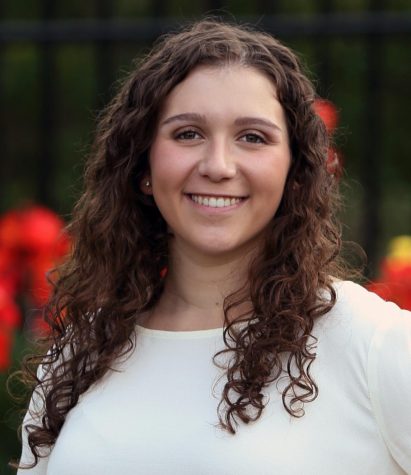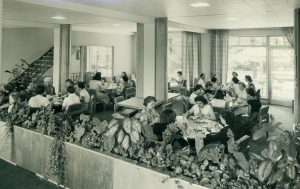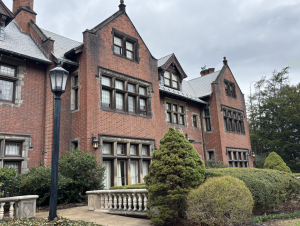Guest Voices: Jewish Student Association president reflects on antisemitism on college campuses
Guest Voices is an occasional series that invites students to share their views about a topic of importance and interest to them on campus.

November 20, 2020
By Leah Berman-Kress of the Chatham Jewish Student Association
It’s no secret that antisemitism is at an all-time high both globally and nationally. It is an especially prevalent issue on college campuses.
The International Holocaust Remembrance Alliance developed a working definition for antisemitism: “Antisemitism is a certain perception of Jews, which may be expressed as hatred toward Jews. Rhetorical and physical manifestations of antisemitism are directed toward Jewish or non-Jewish individuals and/or their property, toward Jewish community institutions and religious facilities.”
On Aug. 25, the Chabad Center at the University of Delaware was set on fire. This arsonist intentionally destroyed a safe space for Jewish students.
More recently, students called out antisemitism at the University of Connecticut. “The Third Reich” was written on a student’s door in one of the residence halls, according to the University of Connecticut Hillel’s Instagram account.
Many Jewish college students are bombarded with antisemitic comments and actions on a daily basis. It is disheartening and exhausting to endure. Antisemitism is such a widespread issue that an Instagram account, @jewishoncampus, was created to highlight and condemn these acts across American universities. Since the account began this July, there are already more than 200 posts.
As college students, we are still figuring out who we are. According to The Anti-Defamation League, “some [students] are especially vulnerable to hatemongers who either stir their developing political passions or couch bigotry in academic terms designed to appeal to their intellectual curiosity.”
As a campus community, we cannot stand by and let this happen. Chatham University’s Jewish community needs active allies to stand with us and fight antisemitism.
The attack at the Tree of Life Synagogue building, in which members of three congregations were killed, on Oct. 27, 2018 robbed Jewish students of our sense of safety. Eleven members of the Pittsburgh Jewish community were killed, and Chatham’s Jewish students were left shaken. After this attack, it is more important than ever that Jewish allies are actively and fiercely supportive.
Chatham held a service and vigil following the attack, and at least 100 people were in attendance. However, the recent second commemoration of the attack was not afforded that same level of support.
Jewish students still struggle with this terrible act, and our feelings are just as raw as they were in 2018. We still need support, even years later. While we are still grieving, we wonder: Has the rest of the Chatham community moved on?
I received dozens of sympathetic text messages and saw countless social media posts supporting the Jewish community in 2018. However, this year, I only saw a handful of both. Understandably, we were not able to gather as a community this year because of the COVID-19 pandemic, but this doesn’t mean there aren’t other ways to be an ally.
Antisemitism is an issue that Chatham needs to face head-on. Just because there aren’t overtly antisemitic acts on Chatham’s campus does not mean that antisemitism does not exist in our community.
Microaggressions are the main way that antisemitism is presented at Chatham. Other minority groups have also discussed the frequency of microaggressions on campus. For example, making a joke about Jews being cheap or greedy is antisemitic. Similarly, minimizing the impact of the Holocaust is extremely harmful. It is important that allies speak up when they hear microaggressions on campus. If these issues aren’t addressed, then they will never be resolved.
One student, who wishes to remain anonymous, expressed their experiences with antisemitism at Chatham, especially following the attack at the Tree of Life Synagogue building:
“Often, I have had to repeat my stance on Israel or explain a basic principle of Judaism in exchange for someone telling me something about my own identity. The worst antisemitic experience for me on campus was after the attack at the Tree of Life building.
“First, Chatham did not provide adequate support for Jewish students in that time on campus, and we were basically forced to proceed as normal. Multiple professors were upset at either myself or my peers for being visibly upset in class the time following the attack. It wasn’t until we asked for listening spaces that Chatham gave us a place to share our feelings about how isolated we felt on campus.
“However at a CSG meeting that was specifically planned to talk about the attack, I was constantly spoken over and the meeting ended up being dominated by non-Jewish students who only cared about how the false-alert text had affected them. The worst for me is that multiple people who had been micro-aggressively rude to me before Tree of Life (acting weird about Jewish customs, acting like I was rich because I was Jewish, etc.) immediately tokenized me following it, showing how I was their one Jewish ‘friend’ and crying to me about how sorry they were that it had happened without actually providing the support I needed.
“The sad thing is that I have countless other stories, some more graphic than these that have happened to me during my time at Chatham. I hope the school will someday learn from the months following that day, but I still have yet to see it.”
One hurtful way in which antisemitism is displayed on campus is through anti-Zionism. Anti-Zionism is defined by the Anti-Defamation League as “a prejudice against the Jewish movement for self-determination and the right of the Jewish people to a homeland in the State of Israel.” Many students don’t understand the point at which anti-Israel rhetoric becomes antisemitic.
It is OK to criticize Israel’s actions or policies, but it becomes antisemitic when Israel’s existence is questioned. It is inappropriate to say that the Jewish people don’t have a place to belong and feel safe. We can critique any government without being against the nation itself. If grievances with Israel are motivated by prejudices against the Jewish people, the arguments are inherently antisemitic. Further, holding Jewish people accountable for the actions and policies of the Israeli government is antisemitic, as well.
However, we don’t only need allies in times of tragedy and during the fight against antisemitism. We also want to celebrate holidays with you and share our culture.
Chatham’s Jewish community takes pride in our identity. We need help from our allies to fight against antisemitism so that we can continue to freely express our culture and beliefs without fear.
Resources regarding antisemitism across universities in the United States can be found at https://www.adl.org/campus-anti-semitism-and-hate.
More information on Chatham’s Jewish Student Association can be found on their Instagram @jsa.chathamu.
 Leah Berman-Kress is a junior at Chatham University majoring in human communication and marketing. She is also the founder and current President of the Jewish Students’ Association, which aims to enhance Jewish life on Chatham’s campus.
Leah Berman-Kress is a junior at Chatham University majoring in human communication and marketing. She is also the founder and current President of the Jewish Students’ Association, which aims to enhance Jewish life on Chatham’s campus.






